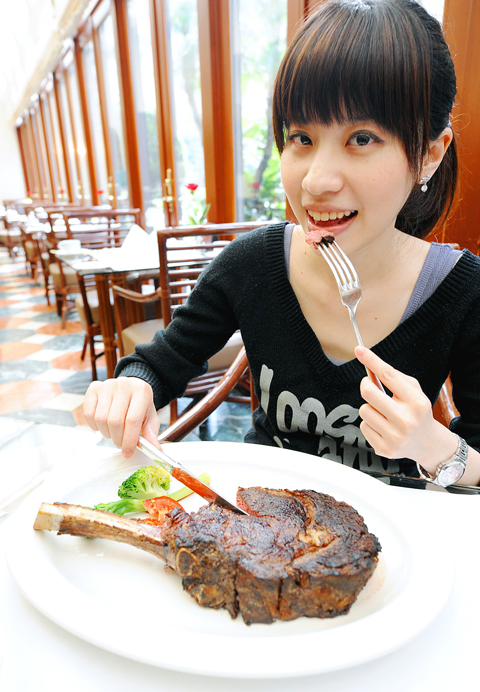The US will consider appealing to the WTO to resolve the row with Taiwan over US beef imports, Deputy US Trade Representative Demetrios Marantis said on Thursday in Washington.
Speaking at the Center for Strategic International Studies, Marantis said the Taiwanese legislature’s about-face on imports of US beef had “effaced sound science and effaced the protocol Taiwan and the US had negotiated,” and that he was very disappointed with the outcome.
He said that US beef was consistent with standards set by the World Organization for Animal Health and that Taiwan’s decision had no scientific basis. He made the same response when asked about the bans on US beef imports in South Korea and Japan.

PHOTO: CNA
A report quoted the US trade representative as saying the US was contemplating using all possible means to resolve its differences with Taiwan, including the WTO court.
Marantis was non-committal on when Trade and Investment Framework Agreement (TIFA) talks with Taiwan would be held.
The US has made clear its stance and the ball was in Taiwan’s court on how to approach the issue, he said, adding that Taiwan’s reputation as an international trading partner has been tarnished by the disagreement over beef.
The report said Canada also considered taking Taiwan to the WTO court for refusing to lift a ban on Canadian bone-in beef while giving the US the green light.
Earlier this week, a group of US academics suggest in a Web cast that the US should bring the beef issue to the WTO.
Commenting on Marantis’ remarks, the Bureau of Foreign Trade (BOFT) yesterday reiterated that the beef dispute should not become a barrier to bilateral economic ties, adding that the US’ interests remain secure in the case.
Bureau Director-General Huang Chih-peng (黃志鵬) said that Taiwan’s decision to ban imports of US ground beef and bovine offal should not become an issue because these products account for only a very small share of the beef trade between the two countries.
The US’ largest interests lie in bone-in beef, which accounts for more than 90 percent of its beef exports to Taiwan by dollar value, Huang said, adding that it has now regained access to Taiwan’s market.
“Taiwan has done its best to protect US trade interests,” he said.
Huang urged Washington to take into account its maximal profit from the beef trade in its decision on whether to resort to the WTO dispute settlement process.
He said the beef trade dispute was an “isolated incident” that should not be allowed to delay the resumption of talks between the two sides.
BOFT officials said in the event of a WTO arbitration case, Taiwan would be required to provide scientific evidence to back up its decision to ban imports of US ground beef and bovine offal, which could pose difficulties for Taiwan.
ADDITIONAL REPORTING BY JENNY W. HSU

A Ministry of Foreign Affairs official yesterday said that a delegation that visited China for an APEC meeting did not receive any kind of treatment that downgraded Taiwan’s sovereignty. Department of International Organizations Director-General Jonathan Sun (孫儉元) said that he and a group of ministry officials visited Shenzhen, China, to attend the APEC Informal Senior Officials’ Meeting last month. The trip went “smoothly and safely” for all Taiwanese delegates, as the Chinese side arranged the trip in accordance with long-standing practices, Sun said at the ministry’s weekly briefing. The Taiwanese group did not encounter any political suppression, he said. Sun made the remarks when

The Taiwanese passport ranked 33rd in a global listing of passports by convenience this month, rising three places from last month’s ranking, but matching its position in January last year. The Henley Passport Index, an international ranking of passports by the number of designations its holder can travel to without a visa, showed that the Taiwan passport enables holders to travel to 139 countries and territories without a visa. Singapore’s passport was ranked the most powerful with visa-free access to 192 destinations out of 227, according to the index published on Tuesday by UK-based migration investment consultancy firm Henley and Partners. Japan’s and

BROAD AGREEMENT: The two are nearing a trade deal to reduce Taiwan’s tariff to 15% and a commitment for TSMC to build five more fabs, a ‘New York Times’ report said Taiwan and the US have reached a broad consensus on a trade deal, the Executive Yuan’s Office of Trade Negotiations said yesterday, after a report said that Washington is set to reduce Taiwan’s tariff rate to 15 percent. The New York Times on Monday reported that the two nations are nearing a trade deal to reduce Taiwan’s tariff rate to 15 percent and commit Taiwan Semiconductor Manufacturing Co (TSMC, 台積電) to building at least five more facilities in the US. “The agreement, which has been under negotiation for months, is being legally scrubbed and could be announced this month,” the paper said,

MIXED SOURCING: While Taiwan is expanding domestic production, it also sources munitions overseas, as some, like M855 rounds, are cheaper than locally made ones Taiwan and the US plan to jointly produce 155mm artillery shells, as the munition is in high demand due to the Ukraine-Russia war and should be useful in Taiwan’s self-defense, Armaments Bureau Director-General Lieutenant General Lin Wen-hsiang (林文祥) told lawmakers in Taipei yesterday. Lin was responding to questions about Taiwan’s partnership with allies in producing munitions at a meeting of the legislature’s Foreign Affairs and National Defense Committee. Given the intense demand for 155mm artillery shells in Ukraine’s defense against the Russian invasion, and in light of Taiwan’s own defensive needs, Taipei and Washington plan to jointly produce 155mm shells, said Lin,